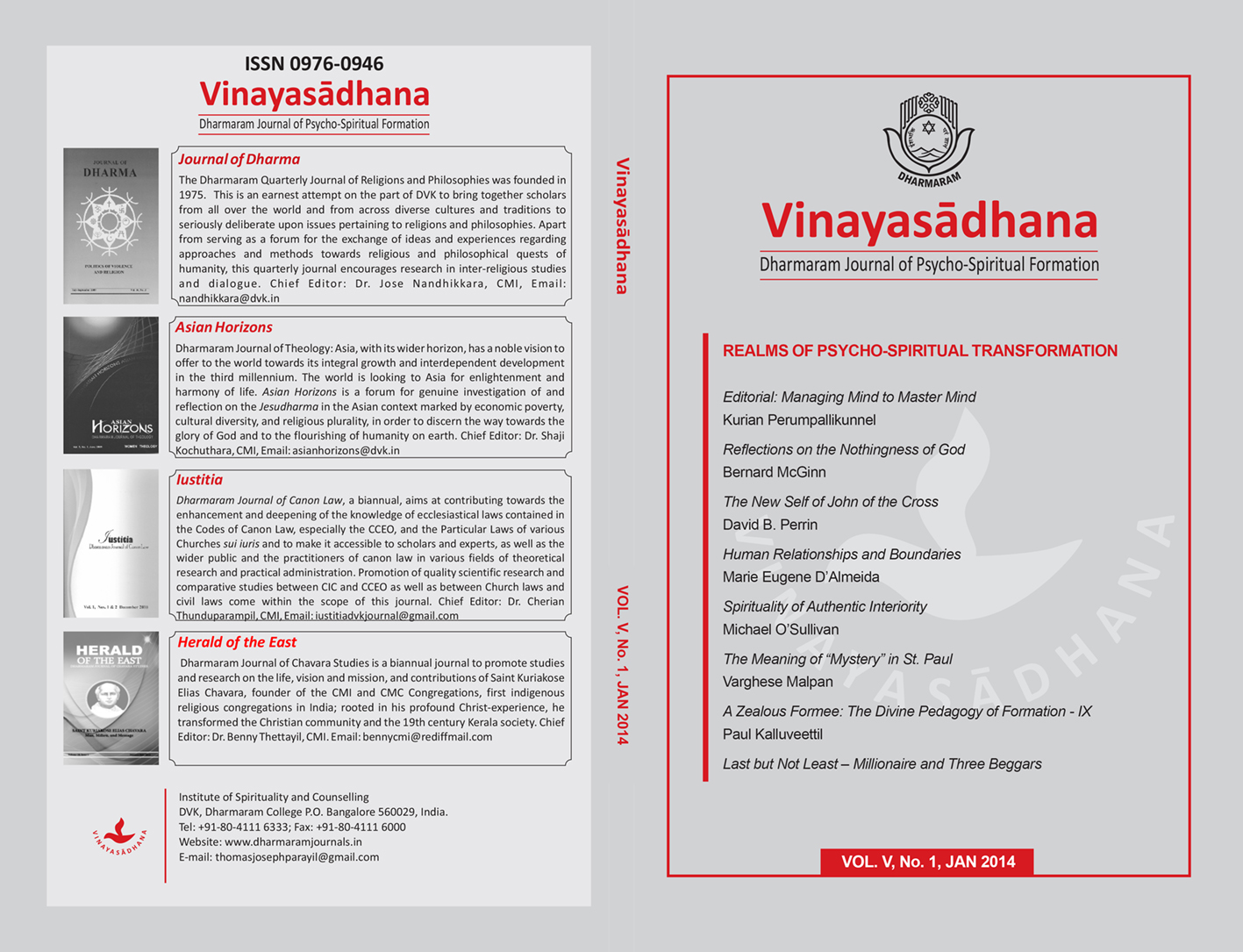The Spirituality of Authentic Interiority and the Option for the Economically Poor
Keywords:
Authentic Interiority, Option for the Economically Poor, Art of inwardnessAbstract
O’Donohue’s endorsement of ‘the art of inwardness,’ though captivating is open to misunderstandings. Interiority is often branded as a withdrawal from or refusal to engage the public realm with a view to serve oneself embracing a spirituality of detachment. This article is an attempt to explore the notion of interiority in its diverse textures and to propose authentic interiority as a spiritual praxis (reflective and reflexive practice aimed at developing access to, affirmation of, and personal response to ultimate reality) of engagement with the world. The article will further explore how such praxis grounds and develops a preferential option for the economically poor, who constitute the majority of the world’s population. Engaging in a continuous soul-searching into one’s own foundational human spirit a person can arrive at a realization that at the level of common human experience they themselves hunt for such human goods as food, shelter, clothing, relaxation, education, health and friendship.
References
Doran, R. (1990, rev. edit.) Theology and the Dialectics of History. Toronto: University of Toronto Press.
Dunne, T. (n.d.) Unpublished Notes.
Frohlich, M. (2007) “Critical Interiority” Spiritus: A Journal of Christian Spirituality, 7(1):77-81.
Frohlich, M. (2005). “Spiritual Discipline, Discipline of Spirituality: Revisiting Questions of Definition and Method.” In Minding the Spirit: Contours and Dynamics of a Discipline, edited by Elizabeth A. Dreyer and Mark S. Burrows, 65-78. Baltimore: Johns Hopkins University Press.
Gottwald, N. (1979) The Tribes of Yahweh: A Sociology of the Religion of Liberated Israel, 1250-1050 B.C.E.Maryknoll, NY: Orbis Books.
Gutiérrez, G. (1983; Spanish original, 1979) The Power of the Poor in History. Maryknoll, NY: Orbis Books.
Gutiérrez, G. (1984) We Drink From Our Own Wells: The Spiritual Journey of a People. Maryknoll, NY: Orbis Books, second printing.
Lonergan, B. (1974) “The Subject” In A Second Collection: Papers by Bernard J. F. Lonergan, ed. William F. J. Ryan, SJ, and Bernard J. Tyrrell, SJ, 69-86. London: Darton, Longman & Todd. Lonergan, B. (1990) Method in Theology. Toronto: University of Toronto Press.
Loewe, W. P. (1981) “Toward a Responsible Contemporary Soteriology” In Creativity and Method: Essays in Honor of Bernard Lonergan, S.J., ed. Matthew L. Lamb, 213-27. Milwaukee, Wisconsin.
O’Donohue, J. (2007) “The Inner Landscape of Beauty, “On Being podcast of interview with John O’Donohue by Kirsta Tippett.
http://www.onbineg.org/program/inner-landscape-beauty/203/history. Retrieved on 09/02/2013.
O’Sullivan, M. (1990) A Liberation Image of God. Doctrine and Life 41(2):65-68
O’Sullivan, M. (1999) “Women, Poverty and Christianity in Relation to Africa”, Milltown Studies, no. 44 (Winter):103-29.
O’Sullivan, M. (2008) “The Human Spirit and the Option for the Economically Poor”, In With Wisdom Seeking God: The Academic Study of Spirituality, edited by Una Agnew, Bernadette Flanagan, and Greg Heylin, 223-33. Leuven: Peeters Press.
O’Sullivan, M. (2010a) “Reflexive and Transformative Subjectivity: Authentic Spirituality and a Journey with Incest” In Sources of Transformation: Revitalising Christian Spirituality, edited by Edward and Peter Tyler Howells, 173-82. London: Continuum.
O’Sullivan, M. (2010b) How Can Roman Catholic Theology Transform Male Violence Against Women. Lewiston, NY: Edwin Mellen Press.
O’Sullivan, M. (2012) “Spiritual Capital and the Turn to Spirituality” In Spiritual Capital – The Practice of Spirituality in Christian Perspective, edited by Michael O’Sullivan and Bernadette Flanagan, 43-59. Farnham: Ashgate.
Saiving, V. (1979) “Sin and the Feminine Condition” In Woman spirit Rising: A Feminist Reader in Religion, edited by Carol Christ and Judith Plaskow, 25-42. San Francisco: Harper and Row.
Schneiders, S. (2010) “Spirituality and the God Question” Spiritus 10(2):243-50.
Schüssler Fiorenza, E. (1984) Bread Not Stone: The Challenge of Feminist Biblical Interpretation. Boston: Beacon Press.


